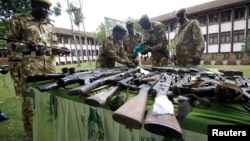NAIROBI, KENYA —
The Kenya Wildlife Service says two wildlife rangers were killed Thursday responding to dozens of suspected poachers in the Kipini Conservatory game reserve on Kenya’s coast.
Officials say the suspected poachers were armed with AK-47 rifles and opened fire on several rangers who were responding to a poaching incident inside the reserve.
Kenyan Wildlife Service spokesman Paul Mbugua says the rangers were actually attacked twice and one of the two men killed was a commander. One poacher was also killed.
“Then after that particular incident the rangers made a tactical withdrawal and then later they moved in to collect the body of the fallen ranger, and as they moved in to collect the body, the poachers were lying in wait," he said. "They actually set up an ambush, and the rangers together with the police they were fired at, and during that second incident, which occurred at five in the evening, one of our officers who was actually the officer commanding the team actually went down.”
Mbugua said poachers are getting bold and patient. He said that after the first shooting incident, poachers had to lie low for up to five hours, waiting for the rangers to come back, knowing eventually they will come to collect the body of their fallen ranger.
“They are extremely brave and this is what we have been communicating, and you can see they are very sophisticated. One particular poacher had 208 rounds on him, he had three magazines for his firearm and he had other rounds of ammunitions of course in his possession," he said. "And that tells you that these guys are willing to go to any length to ensure that they get their way.”
According to a recent United Nations Environment Program study, the number of elephants illegally killed in Africa has doubled over the last decade, reaching 25,000 killed in 2012, while the ivory trade has tripled in size.
Experts say the poaching of African elephants is at an all-time high, raising the possibility that the species could become extinct this century.
Trade in ivory was made illegal in 1989. Demand for ivory remains high in Asia, however, where it is used for ornaments and traditional medicine.
Officials say the suspected poachers were armed with AK-47 rifles and opened fire on several rangers who were responding to a poaching incident inside the reserve.
Kenyan Wildlife Service spokesman Paul Mbugua says the rangers were actually attacked twice and one of the two men killed was a commander. One poacher was also killed.
“Then after that particular incident the rangers made a tactical withdrawal and then later they moved in to collect the body of the fallen ranger, and as they moved in to collect the body, the poachers were lying in wait," he said. "They actually set up an ambush, and the rangers together with the police they were fired at, and during that second incident, which occurred at five in the evening, one of our officers who was actually the officer commanding the team actually went down.”
Mbugua said poachers are getting bold and patient. He said that after the first shooting incident, poachers had to lie low for up to five hours, waiting for the rangers to come back, knowing eventually they will come to collect the body of their fallen ranger.
“They are extremely brave and this is what we have been communicating, and you can see they are very sophisticated. One particular poacher had 208 rounds on him, he had three magazines for his firearm and he had other rounds of ammunitions of course in his possession," he said. "And that tells you that these guys are willing to go to any length to ensure that they get their way.”
According to a recent United Nations Environment Program study, the number of elephants illegally killed in Africa has doubled over the last decade, reaching 25,000 killed in 2012, while the ivory trade has tripled in size.
Experts say the poaching of African elephants is at an all-time high, raising the possibility that the species could become extinct this century.
Trade in ivory was made illegal in 1989. Demand for ivory remains high in Asia, however, where it is used for ornaments and traditional medicine.
